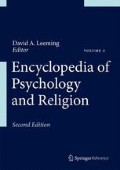Bibliography
Abi-Hashem, N. (2003). The difficult task of defining and understanding terrorism. International Psychology Reporter: APA’s Division 52 Newsletter, 6(3/4), 25–26.
Abi-Hashem, N. (2004). Peace and war in the Middle East: A psychopolitical and sociocultural perspective. In F. M. Moghaddam & A. J. Marsella (Eds.), Understanding terrorism: Psychosocial roots, consequences, and interventions (pp. 69–89). Washington, DC: American Psychological Association Press.
Abi-Hashem, N. (2007). The psychology of religious conversion: A socio-cultural and spiritual analysis. In D. McCarthy, R. B. VanderVennen, & J. McBride (Eds.), Surprised by faith: Conversion and the academy. Newcastle Cambridge Scholars.
Abi-Hashem, N. (2010). Caregiving and counseling in an age of globalization, secularization, and radicalization. Unpublished manuscript.
Abi-Hashem, N. (2011). Working with Middle Eastern immigrant families. In A. Zagelbaum & J. Carlson (Eds.), Working with immigrant families: A practical guide for counselors (pp. 151–180). New York: Routledge.
Abi-Hashem, N. (2012a). Cults and sects. In C. Figley (Ed.), Encyclopedia of trauma: An interdisciplinary guide (pp. 170–173). Thousand Oaks: Sage.
Abi-Hashem, N. (2012b). Internet terrorism. In C. Figley (Ed.), Encyclopedia of trauma: An interdisciplinary guide (pp. 329–332). Thousand Oaks: Sage.
Abi-Hashem, N. (2012c). Religious fundamentalism. In C. Figley (Ed.), Encyclopedia of trauma: An interdisciplinary guide (pp. 544–547). Thousand Oaks: Sage.
Abi-Hashem, N. (2013). Parapsychology, sects, cults, and religious fundamentalism. In T. G. Plante (Ed.), Abnormal psychology across the ages (Vol. I, pp. 231–246). Santa Barabara: ABC-CLIO/Praeger.
Abi-Hashem, N., & Driscoll, E. G. (2013). Cultural anthropology. In K. D. Keith (Ed.), Encyclopedia of cross-cultural psychology. Malden: Wiley-Blackwell.
Almond, G. A., Appleby, R. S., & Sivan, E. (2003). Strong religion: The rise of fundamentalisms around the world. Chicago: University of Chicago Press.
Armstrong, K. (2005, January). Fundamentalism is here to stay. Global Agenda, 3, 234–236.
Barzilai-Nahon, K., & Barzilai, G. (2005). Cultured technology: The internet and religious fundamentalism. The Information Society, 21(1), 25–40.
Berman, E. (2009). Radical, religious, and violent: The new economics of terrorism. Cambridge, MA: MIT Press.
Caplan, L. (Ed.). (1987). Studies in religious fundamentalism. London: McMillan.
Council of Foreign Relations. (2004). Terrorism: Questions and answers. Retrieved from http://cfrterrorism.org/terrorism/introduction.html. Accessed 5 Nov 2012.
Cronin, A. K. (2007). How terrorism ends. Princeton: Princeton University Press.
Friedman, M., & Rholes, W. S. (2008). Religious fundamentalism and terror management. The International Journal for the Psychology of Religion, 18(1), 36–52.
Gallagher, S. (2005–2006). The suicide bomber and the leap of faith. Free Inquiry, 26(1), 34–36.
Gayraud, J. F. (1988). Definir le terrorisme: Est-ce possible, est-ce souhaitable? [Defining terrorism: Is it possible, is it desirable?]. Revue Internationale de Criminologie et de Police Technique, 41(2), 185–202.
Hood, R. W., Hill, P. C., & Williamson, W. P. (2005). The psychology of religious fundamentalism. New York: Guilford.
Lee, A. (2011). Who becomes a terrorist? World Politics, 63(2), 203–245.
Lewis, J. R. (Ed.). (2004). The Oxford handbook of new religious movements. Oxford: Oxford University Press.
Mercer, C. (2009). Slaves to faith: A therapist looks inside the fundamentalist mind. Westport: Praeger.
Metz, S. (2006, February 17). Is there really a cure for terrorism? The Daily Star, Lebanon. Retrieved from http://www.dailystar.com.lb/article.asp?edition_id=10&categ_id=5&article_id=22273. Accessed 5 Nov 2012.
Santosh, C. S. (Ed.). (2004). Religious fundamentalism in the contemporary world: Critical social and political issues. Lanham: Lexington.
Shapiro, J. N. (2012). Terrorist decision-making: Insights from economics and political science. Perspectives on Terrorism, 6(4–5), 5–20.
Wiviott, G. (2007). The psychology of fundamentalism. Retrieved from http://infosect.freeshell.org/infocult/The_Psychology_of_Fundamentalism-Gerald_Wiviott.pdf. Accessed 5 Nov 2012.
Author information
Authors and Affiliations
Corresponding author
Editor information
Editors and Affiliations
Rights and permissions
Copyright information
© 2014 Springer Science+Business Media New York
About this entry
Cite this entry
Abi-Hashem, N. (2014). Religious Fundamentalism and Terrorism. In: Leeming, D.A. (eds) Encyclopedia of Psychology and Religion. Springer, Boston, MA. https://doi.org/10.1007/978-1-4614-6086-2_9341
Download citation
DOI: https://doi.org/10.1007/978-1-4614-6086-2_9341
Publisher Name: Springer, Boston, MA
Print ISBN: 978-1-4614-6085-5
Online ISBN: 978-1-4614-6086-2
eBook Packages: Behavioral Science

